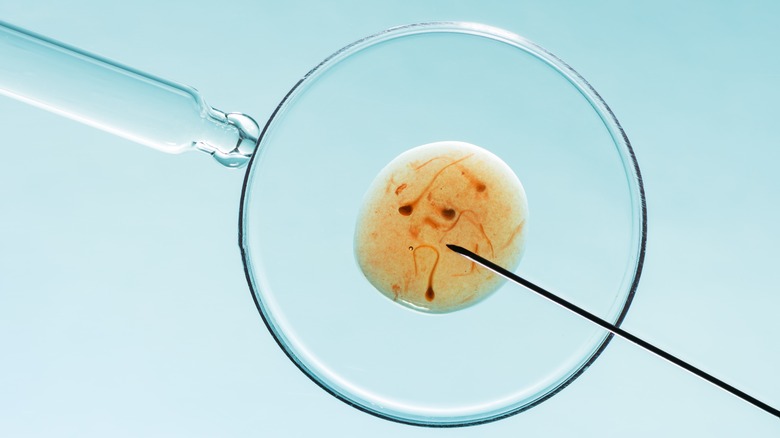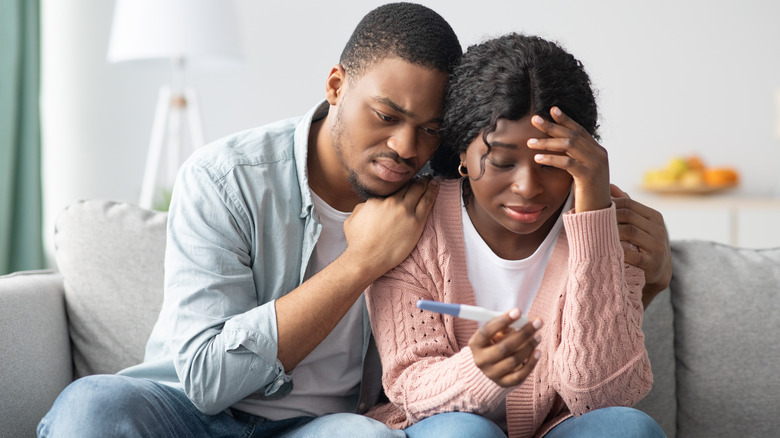What Happens To Your Body When You Do IVF Treatments
If you are starting your IVF (in vitro fertilization) journey soon, you may be feeling many emotions such as excitement, worry, or fear, all of which are normal (via Society for Assisted Reproductive Technology). Some of the anxiety surrounding IVF has to do with the many changes your body and mind go through during the process. The goal of this article is to address some of the most common things that happen in your body during each phase of IVF so that you can feel better prepared, gaining a sense of control over a process that often seems so out of your control.
According to Cleveland Clinic, IVF is a fertility procedure involving many complex steps, including eggs being removed from the body (donor eggs or your eggs) and then being fertilized with sperm (donor or partner) outside the body in a medical lab. IVF is mostly used by couples who struggle to achieve pregnancy naturally and need additional help, and is considered the most effective form of assisted reproductive technology (ART) to date. The Mayo Clinic states that the process can take anywhere from a few weeks to much longer depending on if there are any pauses between steps. IVF is often considered the most advanced fertility treatment, as it produces the best outcomes of all fertility procedures; it is also the most expensive.
There are five steps to a standard IVF protocol, which includes the following in order: ovulation induction, egg retrieval, sperm retrieval, fertilization, and embryo transfer. A completion of all five steps from start to finish marks one completed "cycle" of IVF. Sometimes, multiple cycles are necessary to achieve successful conception, and success rates vary widely from clinic to clinic, doctor to doctor, and patient to patient because of age, genetics, and other factors.
You may feel sad, depressed, angry, or anxious (throughout all stages)
Throughout all phases of IVF, including before and after the completion of an IVF cycle, you may feel depressed, angry, or anxious, often swinging from one mood to another. These intense emotions are both a direct result of certain IVF drugs (FSH, LH) and the psychological effects of infertility and the IVF process itself, per New Life Georgia.
According to a 2021 review published in Experimental and Therapeutic Medicine, "Typical reactions to infertility include shock, sadness, depression, anger and frustration, loss of self-esteem and self-confidence and a general loss of sense of control." The National Infertility Association (RESOLVE) states that infertility is a "nonlinear" grieving process marked by many highs and lows, and that the grief of infertility is often compounding because the losses can pile onto each other.
Research also shows that infertility can be a very traumatic experience, leading to social isolation, stress, and self-criticism, per the Center of Perinatal Excellence (COPE). Some emotions that IVF patients may experience include: grief from not being able to start a family "naturally" or having to use an egg or sperm donor, displaced anger toward your supportive partner, feeling that you are at the end of your rope after less invasive fertility treatments or previous unsuccessful IVF cycles, feelings of jealousy, envy, or resentment, financial stress, or difficulty in social situations such as being around babies, pregnancy announcements, or attending baby showers. It is important that you give yourself grace at this time, and COPE states there are ways to help yourself feel better, such as finding an empathetic counselor who has experience with infertility or cognitive behavioral therapy, or joining a support group, which can be particularly beneficial.
Your appetite may increase or decrease substantially
The first stage of IVF is ovulation induction. During this stage, several IVF medications are given to encourage the maturation of multiple eggs, in order to increase the odds of successful conception, per the Mayo Clinic. These include injectable drugs to stimulate growth of follicles in the ovaries, such as follicle-stimulating hormone (FSH) or luteinizing hormone (LH), medications to "mature" eggs to final development such as human chorionic gonadotropin (hCG), and medications to prevent premature ovulation and/or to prepare the uterine lining (progesterone) for implantation. All of these injectable medications have side effects, with changes in appetite being noted among them.
According to the Park Avenue Fertility, some patients notice an uptick in their appetite due to side effects of ovulation induction meds or emotional effects of the treatment itself; both are likely culprits. When Dr. Lauren Sundheimer of the Newport Fertility Center was interviewed by Popsugar, she explained some of the reasons why IVF drugs may cause an uptick in appetite, stating "These medications change the body's normal hormonal balance. It is an effect that we want to get [in order] to get the response that we want, but it also disrupts the normal balance of hormones. This can include feedback that the brain receives for hunger, so some women may have an increased desire to eat."
The good news is that the increase in appetite is not long lasting and usually diminishes as you move closer to egg retrieval due to bloating and a surge in estrogen levels according to reproductive endocrinologist Rashmi Kudesia (via Popsugar). Dr. Kudesia goes on to state that both hunger and loss of appetite are transient and should pass once the cycle is complete.
You may feel bloated
Bloating is also very common during the ovulation induction stage of IVF, according to a recent interview conducted by IVF Babble with Dr. Rut Gomez de Segura, a gynecologist and expert in the fertility field. Dr. de Segura states that not everyone experiences this bloating, but many do, and it is most common toward the end of the ovulation induction stage, shortly before egg retrieval. This is due to the rapid growth of multiple follicles. In a woman's natural cycle, only one egg is released per month, but during IVF, multiple follicles are being triggered to grow; hence, the bloating. And the more follicles that grow, the greater the degree of bloating tends to be.
Fortunately, there are some solutions to ease the bloat such as light exercise like walking or yoga (nothing too strenuous) and staying hydrated by drinking lots of water. You can also talk to your doctor about taking Tylenol if you are having discomfort, though NSAIDs like Advil or Motrin should be avoided.
Most of the time, bloating is normal, but if you are experiencing a weight gain of more than 2 pounds a day, or if you have reduced urine output and significant abdominal pain, you should reach out to your healthcare provider right away.
You may get constipated
Another not-so-fun side effect of ovulation induction and after egg retrieval is constipation (per Healthline). The culprit behind constipation is surging levels of the hormone progesterone. If the cycle is successful, constipation may actually get worse, as pregnancy causes progesterone levels to surge even more — and progesterone relaxes the muscles in the colon, resulting in constipation. The effects of the egg retrieval itself, including anesthesia and fluid collection in the pelvis, may also contribute to constipation, and some drugs such as Cabergoline that may be given to minimize the risk of side effects may also induce constipation.
Fortunately, there are remedies to alleviate this uncomfortable problem, so you don't have to suffer. Stay hydrated both before and after your egg retrieval, and eat fiber-rich foods to add bulk to stool and speed up intestinal transit. Most women are advised to consume about 25-28 grams of fiber per day. High-fiber foods include fruits, veggies, nuts, seeds, lentils, beans, and whole grains. If you don't eat much fiber now, be sure to up your intake gradually, as too much as once can cause discomfort and bloating. If these steps don't seem to help or you need more immediate relief, talk to your doctor about trying a laxative or stool softener like Colace or Miralax.
You may get headaches or feel nauseous
Many of the IVF drugs used for ovarian stimulation have headaches and nausea as a side effect. For example, the Fertility Center of San Antonio lists nausea as a side effect of FSH and human menopausal gonadotropin (hMG). HCG commonly causes headaches and bloating, among other side effects. Clomid (Clomiphene), which is sometimes used during IVF, is also notorious for causing headaches, dizziness, and nausea.
Moreover, a 2005 study out of the journal Headache stated the exaggeration of normal hormonal fluctuations that is the goal of IVF in order to promote multiple follicle development leads to many side effects -– headaches among them. Changes in estrogen levels are linked to migraines, and fluctuations in this hormone may even induce migraine headaches. The study assessed the frequency, degree, and timing of headache occurrences during IVF and embryo transfer in 98 women, concluding that in vitro fertilization is associated with various headache occurrences, especially when estrogen levels drop during the downregulation phase of IVF treatment, which is done in order for the physician to take control of the menstrual cycle, putting a person into a temporary menopausal state.
You may feel REALLY tired
You should not be surprised if you feel particularly exhausted during your ovulation induction and all phases of IVF, as fatigue is commonly reported, according to Pacific Fertility Center Los Angeles. They note fluctuating hormone levels as being the primary culprit. Progesterone surges in particular can really bring on fatigue. This is also why fatigue is such a prevalent symptom in early pregnancy; progesterone skyrockets in order to build a healthy uterine lining for the baby.
Many IVF drugs also increase progesterone production in the body, leading to similar levels of fatigue as seen in early pregnancy. Fatigue may also be worsened due to burnout because a woman who turns to IVF has likely been dealing with infertility and the stress it brings for a year or more.
If you are struggling with fatigue at any point during your journey, there are some steps you can take to cope: Listen to your body and don't overexert yourself, get enough sleep, hydrate, eat a nutritious diet, ask for help with errands or chores from your support person or partner, and remember that this difficult time will not last forever.
You may have some pain, cramping, or spotting
Egg retrieval is a medical procedure that removes matured eggs about 34-36 hours after your final injection, according to the Mayo Clinic. It is usually done under anesthesia, as aspiration of the eggs from the follicles involves the insertion of a thin needle through the vaginal wall on either side to access the ovaries (under transvaginal ultrasound guidance).
Side effects after the procedure include pain, abdominal cramping, and sometimes a feeling of bloating or pressure in the pelvis, per CNY Fertility. If these symptoms are particularly bothersome or if you're having a lot of pain, alert your doctor or medical staff right away so they can help you feel more comfortable. Anesthesia can also cause nausea after any surgery. This is why it's important not to eat or drink anything before surgery, as this can make nausea worse or put you at increased risk of choking during surgery, according to the National Health Service (NHS).
It is also normal to bleed or spot a little bit after the procedure, per CNY Fertility, but if you are bleeding profusely or passing large clots, be sure to notify medical staff immediately. The same goes for intense pain or discomfort. Although many patients report little pain by the next day, this is not always the case, and everyone responds differently to surgery.
You may develop Ovarian Hyperstimulation Syndrome (OHSS)
Perhaps of most concern following an egg retrieval is risk for a complication known as Ovarian Hyperstimulation Syndrome, or OHSS. Women who take injectable fertility drugs, especially those who have certain risk factors such as polycystic ovarian syndrome (PCOS), may be at an increased risk for this condition, according to the Cleveland Clinic. OHSS causes fluid to leak out of blood vessels surrounding the ovaries and pool into the abdomen or other areas, causing symptoms like ovarian enlargement, pain, nausea, dehydration, and vomiting. Although OHSS is rare and usually mild due to newer protocols that help prevent this condition, when severe, the excess fluid buildup can cause decreased urine output or difficulty breathing.
If you do experience symptoms of OHSS, try not to panic — remember that serious cases are rare, and most cases will resolve on their own. But if you are experiencing any serious signs such as decreased urine output or difficulty breathing, alert your medical team immediately. If your symptoms are severe or if you can't breathe, it may be necessary to go to the hospital.
Preventing OHSS
Most clinics take steps to reduce OHSS, such as advising patients on diet and hydration. For example, there is evidence that a high-protein diet (small, high-protein meals) shortly before and after egg retrieval may greatly reduce the risk of OHSS. This is because of how proteins work chemically in the body, according to Path Fertility. According to the site, "When battling OHSS, the goal is to increase the amount of solutes in the blood which functions to keep water in the blood vessels rather [than] leak into the abdominal cavity and increase the swelling and discomfort." They go on to explain how protein is digested into amino acids, which act as solutes in the blood, helping to draw water out and prevent fluid buildup. Patients who have severe OHSS and are hospitalized are actually treated with an IV protein called albumin. Protein shakes are a great, easy option to keep in mind that require minimal effort and may be easier to get down with swollen, full ovaries.
Electrolytes like sodium and potassium also serve this purpose, helping to keep fluid where it belongs. For this reason, The American Society For Reproductive Medicine (ASRM) recommends at least a 1 liter of fluids per day, including electrolyte-rich drinks like Gatorade, broth, or Pedialyte (via Path Fertility).
If you have PCOS and are at higher risk for OHSS, you can also talk to your doctor about doing a non-hCG trigger shot the night before your egg retrieval procedure, such as Lupron (leuprolide) trigger, which can greatly reduce the risk of OHSS (via Progyny).
You may spot or bleed after a successful embryo transfer
If your egg retrieval was successful at retrieving eggs that managed to fertilize into embryos with your partner or donor's sperm, then congrats, you are onto the final step of IVF –embryo transfer. This is the step where the selected embryo is placed into your uterus, with the hopes it will successfully implant, becoming a viable pregnancy, per the Mayo Clinic.
Compared to egg retrieval, embryo transfer is usually described as a much milder and even painless process. You may be given a little sedative, but it's unlikely you'll be put to sleep. Afterward, side effects are usually mild and limited to light bleeding or spotting, and possibly mild cramping. For this reason, its not a bad idea to keep some pads and/or panty liners on hand in case you spot or bleed, but your doctor will likely want you to avoid using tampons or putting anything in the vagina after your egg retrieval until you have completely healed from the procedure. Of course, if your symptoms are more severe or you have concerns, speak with your healthcare provider.
You may show early pregnancy signs after successful transfer
After your embryo transfer, you will usually be directed to wait about two weeks before coming back into the clinic for your first blood pregnancy test, according to Healthline. This can be a very nervewracking time for people, so remember to prioritize self care.
While you're waiting, you're likely to analyze every twinge or symptom you're having with the hopes it means the transfer was successful. And while you don't want to overanalyze too much, there are some signs that may hint to a positive pregnancy. Just remember that only a blood pregnancy test can prove so for certain. This is especially important to keep in mind because some symptoms may be related to fertility drugs or other meds you're on.
Some signs of successful embryo transfer include light bleeding or spotting, often coined "implantation bleeding," or mild cramping that may mean the embryo is implanting successfully. Tender, swollen breasts are another very common early pregnancy sign. Fatigue is also very common because progesterone levels rise after successful implantation, making some people feel utterly exhausted. Another symptom that usually comes a little later (second month of pregnancy) is nausea. A missed period may also be a sign, but the hormones you're on may alter the timing of your cycle, so keep that in mind. Of course, all of these symptoms vary widely from person to person, and some people have no symptoms at all and are still pregnant.
Pregnancy may not fix the pain of infertility
If your embryo transfer is successful, while you may be over the moon, you may also experience highs and lows — and this is completely normal. You may feel new concerns or mixed emotions about parenthood that you didn't have before due to being utterly consumed by the IVF process. Also, feelings of anxiety, sadness, and fear do not usually go away overnight, and may even ramp up once pregnancy is achieved (via The New York Times). As one woman expressed to the publication, "Infertility changes how you see yourself and the world. Somewhere along the journey, many of us stop feeling as though it is something that is happening to us, but instead begin to believe that it is a part of who we are. You become used to living in a constant state of fluctuating despair and hope. And this doesn't turn off when and if you get pregnant. It doesn't turn off when you hear or see the heartbeat. My son is 3. I'm still trying to turn it off."
However you feel, just remember that infertility is a lengthy grieving process that should be taken day by day. For example, one study of 200 couples found that 50% of women and 15% of men reported infertility as the most upsetting experience of their lives, per Cedars Sinai. Healing takes time -– end of story.
You may have to repeat a cycle, which can feel crushing
If your embryo transfer doesn't result in a positive pregnancy or if you have a miscarriage, it can feel absolutely devastating after the energy, commitment, and effort you and your partner have put into IVF, but try to remember it is not your fault.
The Reproductive Resources Center recommends giving yourself time to grieve. Cry and weep — you have every reason to. They also advise you to schedule a follow-up appointment with your doctor to discuss what can possibly be done differently next time to increase your odds of success. Many people need more than one cycle of IVF (sometimes six or more for best success rates), so just because it didn't work this time doesn't mean it will never work. The Reproductive Resources Center also has some great tips on different IVF metrics to look at, such as your percentage of healthy embryos, or whether or not you did preimplantation genetic diagnosis testing, which can increase implantation success rates, as well as general tips on how to cope with repeated failed cycles.
Access Fertility recommends prioritizing self-care and allowing yourself the time and space to grieve after an unsuccessful IVF cycle. However you're feeling, know that it's normal, and you have every right to feel this way.














